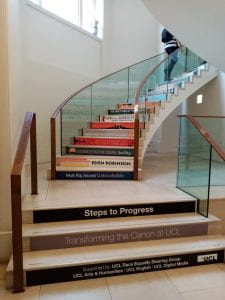Steps to progress – diversity and the literary canon
By ucylsbu, on 5 June 2019
Steps to Progress, an installation project by English PhD candidate Harvey Wiltshire, has recently been installed in the Main Library entrance staircase.
Back in February Harvey issued an open call to the UCL community to suggest texts which reflect the diversity of UCL and the communities in which we live and work. He received around 100 suggestions and then had the unenviable task of selecting the final titles to be included in the installation.
If you are inspired to read any (or all?) of the works I am pleased to say that all of the titles included in the installation are now available from UCL Libraries. Special thanks to Paul Amies and his colleagues for ensuring the new books reached the shelves in time for the opening.
One Response to “Steps to progress – diversity and the literary canon”
- 1
Leave a Reply
You must be logged in to post a comment.
 Close
Close


I suggested Sam Selvon’s ‘The Lonely Londoners’, supporting the back foot in the picture. Glad it was chosen – and highly recommended.
For anyone interested, here’s an excerpt from my reading diary (part of a 2015 MA):
***
In this short novel, the socio-economic realities of immigration are expressed through dialogue, and short, poetic passages of description. There are no chapters, rather scene breaks demarcating the snapshots of people’s lives, people gravitating towards Moses who sits in the middle of it all, a relative old-timer, already long past his own London honeymoon period. Through him we see the psychological bondage of the city that awaits all those around him.
I was reminded of Jonathan Raban’s ‘Soft City’ in the sense that ‘The Lonely Londoners’ is a meditation on the vampiric nature of the metropolis, but Selvon’s method – an unpretentious layering of anecdote upon anecdote rather than an essay – works just as well, if not better. He brings everyone together near the end for a party at St Pancras Hall, but there’s no climactic revelation, no inexorable linking of characters, only the realisation that communities which exist in London are often hidden to those who are part of them, and that the best cures for loneliness are drinking, dancing, and f**king.
It’s a brilliant exploration of people and place, appearing to take a laissez-faire approach to achieving a novelistic kind of resonance. The author is taking risks and making it look easy. Probably what you’d call a seminal London novel. There’s certainly the suggestion of a lot of semen. Fertile stuff.